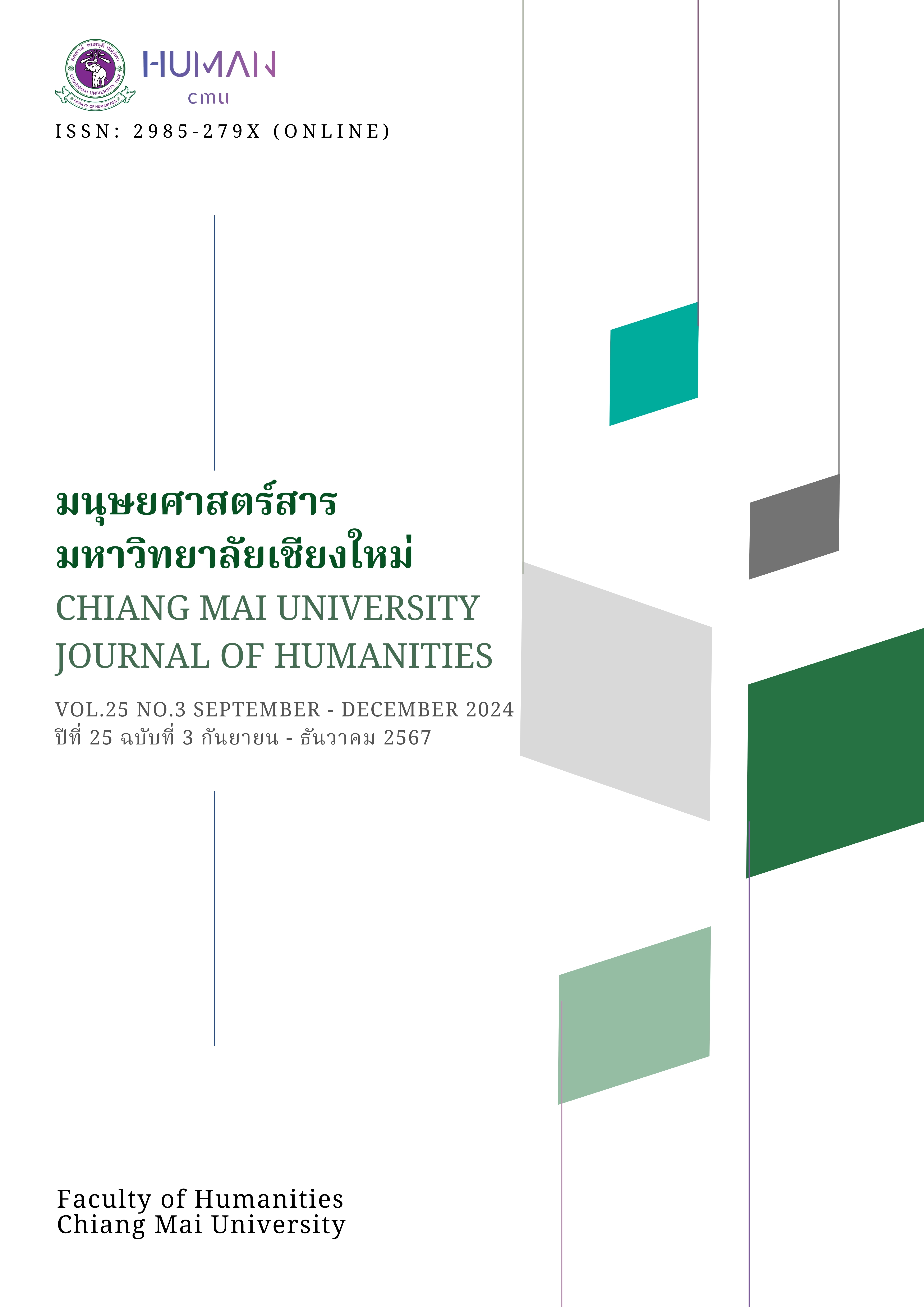ประสบการณ์การมีส่วนร่วมกับกิจกรรมทางดนตรี แบบผู้บริโภคในผู้สูงอายุไทย
Main Article Content
บทคัดย่อ
การวิจัยเชิงคุณภาพครั้งนี้ มีวัตถุประสงค์เพื่อศึกษาประสบการณ์การมีส่วนร่วมทางดนตรีแบบผู้บริโภคในผู้สูงอายุไทย ด้วยการวิจัยเชิงคุณภาพแบบปรากฎการณ์วิทยา ผู้ให้ข้อมูลหลัก คือผู้สูงอายุไทยอายุ 60 ปีขึ้นไป จำนวน 8 คน ที่ผ่านการคัดเลือกแบบเจาะจงตามเกณฑ์ เก็บข้อมูลด้วยการสัมภาษณ์รายบุคคล ผลการวิจัยพบแก่นสาระหลักของประสบการณ์ 4 ประเด็น คือ (1) ดนตรีช่วยปรับใจและอารมณ์ให้เป็นสุข ได้แก่ การฟังเพลงปรับใจ สร้างความสุขในชีวิต และการฟังเพลงปรับอารมณ์ เยียวยาใจ (2) ดนตรีเป็นเครื่องมือในการเรียนรู้ ได้แก่ การฟังเพลงเพื่อเรียนรู้ภาษาและการฟังเพลงเพื่อเข้าใจสังคม (3) ดนตรีเป็นสื่อกลางเชื่อมตนเองกับโลก ได้แก่ เสียงเพลงเป็นสิ่งเชื่อมโลกปัจจุบันและอดีต และเสียงเพลงเชื่อมความสัมพันธ์กับเพื่อน (4) ดนตรีเพื่อการพัฒนาตนเอง ซึ่งเป็นการพัฒนาตัวตนภายใน และการพัฒนาความสัมพันธ์ที่มีต่อคนรอบข้าง ผลการศึกษานี้ทำเกิดความเข้าใจเกี่ยวกับประสบการณ์การมีส่วนร่วมกับกิจกรรมทางดนตรีแบบผู้บริโภคในผู้สูงอายุไทย ด้วยการฟังดนตรีอยู่อย่างสม่ำเสมอ ซึ่งประสบการณ์ดังกล่าวสามารถนำไปใช้ในการพัฒนาจิตใจและส่งเสริมการสูงวัยเชิงบวกในผู้สูงอายุต่อไปได้
Article Details

อนุญาตภายใต้เงื่อนไข Creative Commons Attribution-NonCommercial-NoDerivatives 4.0 International License.
เอกสารอ้างอิง
Chan, M. F., Wong, Z. Y., & Thalaya, N. V. (2011). The effectiveness of music listening in reducing depressive symptoms in adults: A systematic review. Complementary Therapies in Medicine, 19, 332-348.
Creech, A., Hallam, S., McQueen, H., & Varvarigou, M. (2013). The power of music in the lives of older adults. Research studies in music education, 35(1),
-102.
Creech, A., Hallam, S., Varvarigou, M., McQueen, H., & Gaunt, H. (2013). Active music making: A route to enhanced subjective well-being among older people. Perspectives in Public health, 133(1), 36-43.
Dassa, A. (2018). Music Auto-Biography Interview (MABI) as promoting self-identity and well-being in the elderly through music and reminiscence. Nordic Journal of Music Therapy, 27(5), 419-430.
DeNora, T. (2000). Music in everyday life. Cambridge university press.
Giorgi, A. (2017). A response to the attempted critique of the scientific phenomenological method. Journal of phenomenological psychology, 48(1), 83-144.
Greasley, A. E., & Lamont, A. (2011). Exploring engagement with music in everyday life using experience sampling methodology. Musicae Scientiae, 15(1),
-71.
Groarke, J. M., & Hogan, M. J. (2016) Enhancing wellbeing: An emerging model of the adaptive functions of music listening. Psychology of Music, 44(4),
-791.
Groarke, J. M., MacCormac, N., McKenna-Plumley, P. E., & Graham-Wisener, L. (2022). Music listening was an emotional resource and social surrogate for older adults during the COVID-19 pandemic: A qualitative study. Behaviour Change, 39, 168-179.
Kruse, N. B. (2021). Reminiscence and music participation among older adults. Bulletin of the Council for Research in Music Education, (228), 40-58.
Laukka, P. (2007). Uses of music and psychological well-being among the elderly. Journal of happiness studies, 8, 215-241.
Linnemann, A., Strahler, J., & Nater, U. M. (2016). The stress-reducing effect of music listening varies depending on the social context. Psychoneuroendocrinology, 72, 97-105.
McCaffrey, R. (2008). Music listening: its effects in creating a healing environment. Journal of psychosocial nursing and mental health services, 46(10), 39-44.
McCraffrey, R. (2008). Music listening: Its effects in creating a healing environment. Journal of Psychosocial Nursing, 46(10), 39-44.
Menec, V. H. (2003). The relation between everyday activities and successful aging: A 6-year longitudinal study. The Journals of Gerontology Series B: Psychological Sciences and Social Sciences, 58(2), S74-S82.
Rentfrow, P. J. (2012). The role of music in everyday life: Current directions in the social psychology of music. Social and Personality Psychology Compass, 6(5). 402-416.
Rowe, J. W., & Kahn, R. L. (1997). Successful aging. The gerontologist, 37(4),
-440.
Schäfer, T., Sedlmeier, P., Städtler, C., & Huron, D. (2013). The psychological functions of music listening. Frontiers in Psychology, 4, 511.
Sung, H., Chang, A. M., & Lee, W. (2010). A preferred music listening intervention to reduce anxiety in older adults with dementia in nursing homes. Journal of Clinical Nursing, 19, 1056-1064.
Thiamwong, L., Maneesriwongul, W., Malathum, P., Jitapunkul, S., Vorapongsathorn, T., & Stewart, A. L. (2008). Development and psychometric testing of the healthy aging instrument. Pacific Rim International Journal of Nursing Research, 12(4), 285-296.
Wattanasoei, S., Binson, B., Kumar, R., Somrongthong, R., & Kanchanakhan, N. (2017). Quality of life through listening music among elderly people in semi-urban area, Thailand. Journal of Ayub Medical College Abbottabad, 29(1), 21-25.


